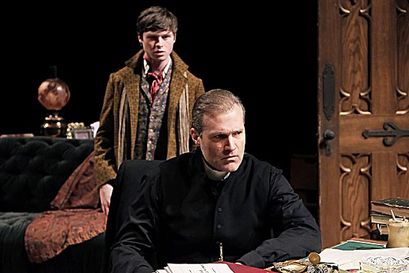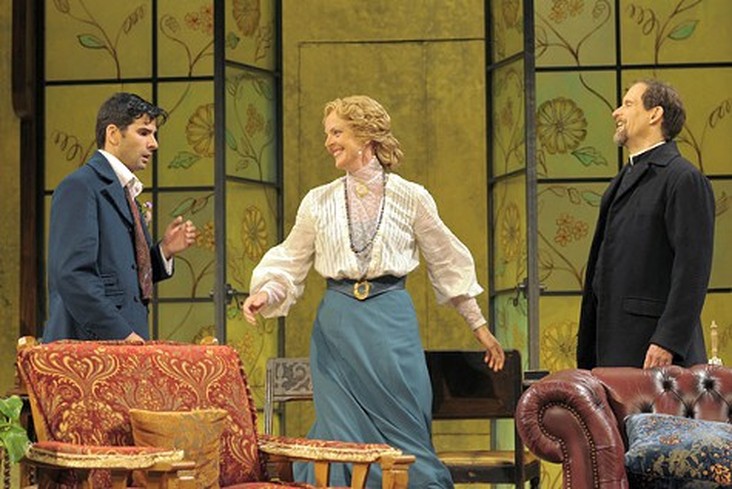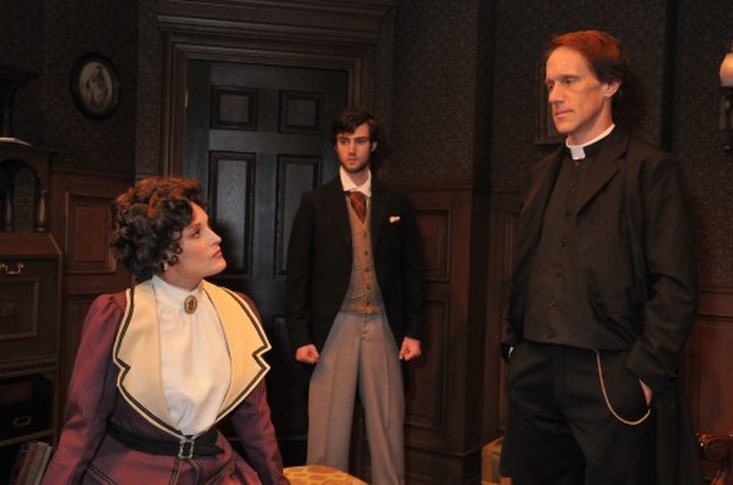 Which man will Candida choose? MARCHBANKS: I know. You feel that you could love anybody that offered– PROSERPINE (exasperated): Anybody that offered! No, I do not. What do you take me for? MARCHBANKS (discouraged): No use. You won't make me real answers – only those things that everybody says. MARCHBANKS (hopelessly): Nothing that's worth saying is proper. One of the biggest realizations I’ve had this past year is that there are relationship people and single people. Relationship people continue to be so even when they are single; those periods are usually brief anyway. Single people continue to be so even when they are in relationships; those periods are usually brief anyway. In 1986, Newsweek caused a firestorm by claiming that women over 40 were “more likely to be killed by a terrorist” than to find a husband. "’The Marriage Crunch’ was based on a study by Harvard and Yale researchers that projected college-educated women had a 20 percent chance of getting married if they were still single at 30, a 5 percent chance at age 35, and just a 2.6 percent chance at age 40.” (Source: http://abcnews.go.com/GMA/story?id=2007889&page=1) Though the statement that women over 40 are more likely to be killed by a terrorist than to find a husband seems ludicrous, it is only so if one believes that a relationship is something that happens to someone, like getting killed by a terrorist or struck by lightning. However, if one looks at relationships as something that one is, it oddly starts making sense. Someone who was in a relationship when they were 25 is more likely to be in a relationship when they are 30 (or 35 or 40) than someone who wasn’t. Being in a relationship is not like playing the lotto; it is not a simple matter of chance. As if to confirm my beliefs, at the end of 2012, I happened to read George Bernard Shaw’s Candida. In some way – though more poetically, of course – I feel he is saying the same thing. Morell and Candida are relationship people. Marchbanks and Proserpine are single people. The play was first published in 1898, which proves that some things don’t change, except maybe the names we give them. For example, Marchbanks is a hipster. If you don’t believe me, read Shaw’s lengthy but appropriately revealing introduction to the character: "He is a strange, shy youth of eighteen, slight, effeminate, with a delicate childish voice, and a hunted tormented expression and shrinking manner that shew the painful sensitiveness of very swift and acute apprehensiveness in youth, before the character has grown to its full strength. […] He is so uncommon as to be almost unearthly; and to prosaic people [i.e. dudebros] there is something noxious in this unearthliness, just as to poetic people [i.e. other hipsters] there is something angelic in it. His dress is anarchic. He wears an old blue serge jacket, unbuttoned, over a woolen lawn tennis shirt, with a silk handkerchief for a cravat, trousers matching the jacket, and brown canvas shoes. In these garments he has apparently lain in the heather and waded through the waters; and there is no evidence of his having ever brushed them.” I’ll be perfectly honest: I might have overrelated to Marchbanks. If he lived in the internet age, Marchbanks would be at his computer writing “missed connections” on Craigslist, though in his hands they would magically manage to escape being utterly nauseating. (I, of course, have never been guilty of writing internet bullshit ripe for ridicule.) Though he feels intensely, he is crippled when comes the time to act out on his emotions: “You must be [shy]: that is the reason there are so few love affairs in the world,” he secretly tells Proserpine, projecting himself onto her, though he is not wrong in doing so. “We all go about longing for love: it is the first need of our natures, the first prayer of our hearts; but we dare not utter our longing: we are too shy.” Marchbanks realizes that love (I mean a relationship) is not something that merely happens, that it is conjured up in the least magical ways, as he continues: “I go about in search of love; and I find it in unmeasured stores in the bosoms of others. But when I try to ask for it, this horrible shyness strangles me; and I stand dumb, or worse than dumb, saying meaningless things—foolish lies. And I see the affection I am longing for given to dogs and cats and pet birds, because they come and ask for it. (Almost whispering.) It must be asked for: it is like a ghost: it cannot speak unless it is first spoken to. (At his normal pitch, but with deep melancholy.) All the love in the world is longing to speak; only it dare not, because it is shy, shy, shy. That is the world's tragedy.” He has no illusions about relationships. He understands that they are not (arguably because they cannot be) based on feelings alone; it would make them too vulnerable. The strength of such relationships can be found in that love cannot disappear if it were never there. It gives the relationship a stronger footing; there is no rug to be pulled from under it. MARCHBANKS (scrambling up almost fiercely): Wicked people means people who have no love: therefore they have no shame. They have the power to ask love because they don't need it: they have the power to offer it because they have none to give. (He collapses into his seat, and adds, mournfully) But we, who have love, and long to mingle it with the love of others: we cannot utter a word. Though he reverses cause and consequence, Marchbanks still has a sense that his unfulfilled love feeds his art. “That is what all poets do: they talk to themselves out loud; and the world overhears them,” he admits. “But it's horribly lonely not to hear someone else talk sometimes.” Of course, were he to hear someone else talk, he might no longer be a poet. Poetry comes from a lack. If everything were to be fulfilled, nothing would ever need to be written or spoken. We could all look at one another knowingly. The all-knowing omnipotent Candida also realizes the fundamental difference between Marchbanks and her husband Morell. When asked to choose between the two, Candida – with her motherly love – picks the weaker of the two. At this statement, both men are devastated. This proves that, despite his dramatic nature, Marchbanks is still more self-aware than Morell. CANDIDA: You remember what you told me about yourself, Eugene: how nobody has cared for you since your old nurse died: how those clever, fashionable sisters and successful brothers of yours were your mother's and father's pets: how miserable you were at Eton: how your father is trying to starve you into returning to Oxford: how you have had to live without comfort or welcome or refuge, always lonely, and nearly always disliked and misunderstood, poor boy! Candida understands that, despite all appearances to the contrary, Marchbanks is the stronger of the two, for he has learned to be alone, so he can be. By weakly trying to defend himself, he only proves her right: “I had my books. I had Nature. And at last I met you.” The things he has: not human beings; the human being he could only meet, never have.
Candida continues to outline the difference between the two men by turning her attention to her husband: “Now I want you to look at this other boy here—my boy—spoiled from his cradle. We go once a fortnight to see his parents. You should come with us, Eugene, and see the pictures of the hero of that household. James as a baby! the most wonderful of all babies. James holding his first school prize, won at the ripe age of eight! James as the captain of his eleven! James in his first frock coat! James under all sorts of glorious circumstances! You know how strong he is (I hope he didn't hurt you)—how clever he is—how happy! (With deepening gravity.) Ask James's mother and his three sisters what it cost to save James the trouble of doing anything but be strong and clever and happy. Ask me what it costs to be James's mother and three sisters and wife and mother to his children all in one.” Morell is the weaker of the two because he has never been alone and therefore has never learned to be alone. He couldn’t. He doesn’t love Candida with the same passion that Marchbanks loves her; but he has something more important working in his favour: he needs her; needs her in a way that Marchbanks will never need her, for the poet can be alone. Morell is not alone because he could not function otherwise. If Candida were to die, he would need to find a new wife as quickly as possible. As Marchbanks capitulates, Morell demonstrates that his own alterity still prevents him from understanding the poet: MARCHBANKS: Out, then, into the night with me! CANDIDA (rising quickly and intercepting him): You are not going like that, Eugene? MARCHBANKS (with the ring of a man's voice—no longer a boy's—in the words): I know the hour when it strikes. I am impatient to do what must be done. MORELL (rising from his knee, alarmed): Candida: don't let him do anything rash. CANDIDA (confident, smiling at Eugene): Oh, there is no fear. He has learnt to live without happiness. MARCHBANKS: I no longer desire happiness: life is nobler than that. Before he leaves, Candida attempts to rationalize with Marchbanks; but, with his poetic mind, he out-rationalizes her and even manages to have the last word: CANDIDA: One last word. (He stops, but without turning to her.) How old are you, Eugene? MARCHBANKS: As old as the world now. This morning I was eighteen. CANDIDA (going to him, and standing behind him with one hand caressingly on his shoulder): Eighteen! Will you, for my sake, make a little poem out of the two sentences I am going to say to you? And will you promise to repeat it to yourself whenever you think of me? MARCHBANKS (without moving): Say the sentences. CANDIDA: When I am thirty, she will be forty-five. When I am sixty, she will be seventy-five. MARCHBANKS (turning to her): In a hundred years, we shall be the same age. But I have a better secret than that in my heart. Let me go now. The night outside grows impatient. CANDIDA: Good-bye. (She takes his face in her hands; and as he divines her intention and bends his knee, she kisses his forehead. Then he flies out into the night. She turns to Morell, holding out her arms to him.) Ah, James! (They embrace. But they do not know the secret in the poet's heart.)
0 Comments
Leave a Reply. |
Sylvain Verstricht
has an MA in Film Studies and works in contemporary dance. His fiction has appeared in Headlight Anthology, Cactus Heart, and Birkensnake. Archives
October 2023
Categories
All
|


 RSS Feed
RSS Feed